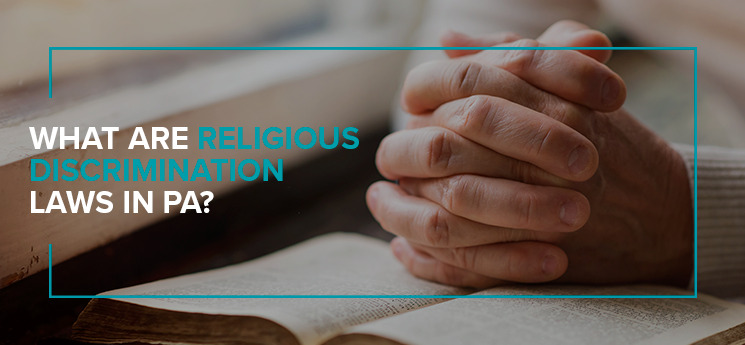While the U.S. has made excellent strides in creating more diverse workplaces in recent years, some forms of discrimination are still prevalent. According to figures released by the U.S. Equal Employment Opportunity Commission (EEOC), this federal agency received 2,404 religious discrimination complaints in 2020 and awarded monetary benefits of $6.1 million.
Although many claimants choose to open a religious discrimination case with the EEOC, they can also file a claim with their state. EEOC data indicates there were 176 charge receipts in Pennsylvania in 2020, representing 7.6% of all religion-based charges in the U.S. and 3.8% of the state’s total discrimination cases.
What Is Religious Discrimination?
Discrimination of religion entails treating people differently because of their religious beliefs. This mistreatment can occur in many ways, including harassment and segregation, along with prohibiting religion-based dress and grooming practices.
However, there are cases when an employer does not have to accommodate an employee’s religious beliefs if doing so would create an undue hardship. Examples include situations where the accommodation would be too costly to implement, compromises workplace safety, reduces efficiency and productivity, requires other employees to take on additional work, or infringes on the rights of others.
Federal and State Religious Discrimination Laws
Title VII of the Civil Rights Act of 1964 is the federal law that prohibits religious discrimination in the workplace. Specifically, Title VII stipulates that organizations with 15 or more employees cannot make employment-related decisions regarding hiring, terminating, promoting and other actions based on an individual’s religion. It also prohibits harassment due to a worker’s religious or cultural beliefs.
Examples of discriminatory practices that may violate Title VII include:
- Prohibiting time off to observe religious holidays.
- Preventing employees from participating in prayer time or other religious practices in the workplace.
- Establishing rules that ban certain foods or customs or forbid the wearing of religious garments.
- Allowing coworkers to make fun of an employee’s religious garb or actions.
- Preventing an employee from working in customer-facing roles due to concerns that the employee’s religious practice might alienate customers.
- Permitting offensive religious jokes or illustrations to circulate freely through the organization via email or other communication methods.
The Pennsylvania Human Relations Act
In addition to Title VII, most states also has laws addressing discrimination. In Pennsylvania, the Pennsylvania Human Relations Act (PHRA) is the state law covering various forms of discrimination in the workplace. Enacted in 1955, the PHRA prohibits employers from discriminating against workers based on their protected status, including race, creed, color, age, ancestry, sex, national origin or use of support animals. The PHRA applies to Pennsylvania state and private employers with at least four employees.
If you are employee of the Commonwealth of Pennsylvania or any subdivision, Section 5.1 of the PHRA, Religious Observance; Public Employees, specifically applies to religious discrimination at work. The three subsections cover the following areas:
- Religious holiday observance: It is an unlawful discriminatory practice to prohibit, prevent or disqualify any individual from obtaining or maintaining employment due to the observance of a Sabbath or other holy day in accordance with the requirements of the person’s religion.
- Remaining at the workplace: Except during an emergency, the employer cannot require an employee to stay at the workplace when the worker is observing a Sabbath or other holy day. However, the employer reserves the right to request the worker to make up the missed time, charge it against paid leave time other than sick leave or treat it as permissible time off without pay.
- Public health worker exception: This section does not apply to any positions dealing with public health and safety where the worker must be available whenever needed. It also does not apply to positions where the nature of the job duties is such that the worker’s presence is considered essential for ensuring the health and safety of others.
How to Handle a Violation of Religious Discrimination Laws
If you believe that your employer or a coworker is engaging in discriminatory practices against your religious rights at work, sit down with your supervisor to discuss the situation. If you’re not satisfied with the outcome, address your concerns with your company’s human resources department. There should be a formal complaint process where the company initiates an investigation and generates a report of your findings.
It is possible that the employer won’t give your complaint the attention it deserves. If you are in Pennsylvania, you have two options for escalating the situation — filing a complaint with the Pennsylvania Human Relations Commission (PHRC) or the EEOC.
PHRC Complaint Process
You can initiate a complaint with the PHRC online, by mail or in person. The deadline to file complaint with the PHRC is relatively short, so it’s important to act quickly if you believe you have a claim. Within 30 days of receiving the document, the PHRC will serve the complaint to your employer, who has 60 days to respond. The agency will then conduct an investigation, which may include a fact-finding conference (FFC) where you and your employer can present evidence and supporting documents and both sides can explore the possibility of a settlement.
The PHRC will determine whether there is probable cause to support your religious discrimination claim. Depending on the outcome, the agency may dismiss your case or hold a conciliation to attempt to resolve the issue. If the conciliation is unsuccessful, the PHRC may order a public hearing and render a decision. Both sides have the option to appeal the findings to the Commonwealth Court of Pennsylvania.
In situations where the PHRC fails to issue a decision within one year of filing your complaint or dismisses it entirely, you can file a lawsuit in Pennsylvania’s state court.
EEOC Complaint Process
The EEOC also gives you the option to file a complaint online, by mail or in person at its Philadelphia or Pittsburgh office. The EEOC will notify your employer of the action within 10 days of filing. The agency may then ask you and your employer to participate in mediation to attempt to resolve the charge. If mediation does not occur or is unsuccessful, the EEOC will request the employer to submit a written response to your charge.
The agency will then launch an investigation, which can take up to 10 months to complete. If the EEOC determines your charge is untimely or that federal employment laws do not apply to your situation, it may choose to close the investigation and issue a Notice of Right to Sue letter to you.
If the EEOC chooses to move forward with the investigation, it will determine whether your complaint has “no cause” or “reasonable cause.” With the former, the agency will issue a Notice of Right to Sue letter. In the latter situation, it will attempt to broker a voluntary settlement. Failure to settle will result in a referral to government attorneys who will decide whether to file a lawsuit. If the government declines to file, the agency will issue you a Notice of Right to Sue letter. Once the EEOC issues a Right to Sue letter, you will only have 90 days to file your federal claims in court, so it’s important to act quickly.
As with PHRC complaints, the deadlines to file with the EEOC are rather short, so it is important not to wait around too long if you believe you have a claim of religious discrimination against your employer.
Get Help From an Experienced Religious Discrimination Lawyer
If you’re in Pennsylvania and believe you are the victim of discrimination against your religion at work, contact the Harrisburg law firm of Weisberg Cummings, P.C. Employment law is the primary focus of our firm. Our skilled attorneys can help you decide whether to pursue a remedy through the EEOC or PHRC and assist with the filing process if you have a viable case. We can also provide experienced legal representation if suing your employer is the appropriate course of action.
Call us at 855-716-2367 or contact us online to schedule a free consultation.



